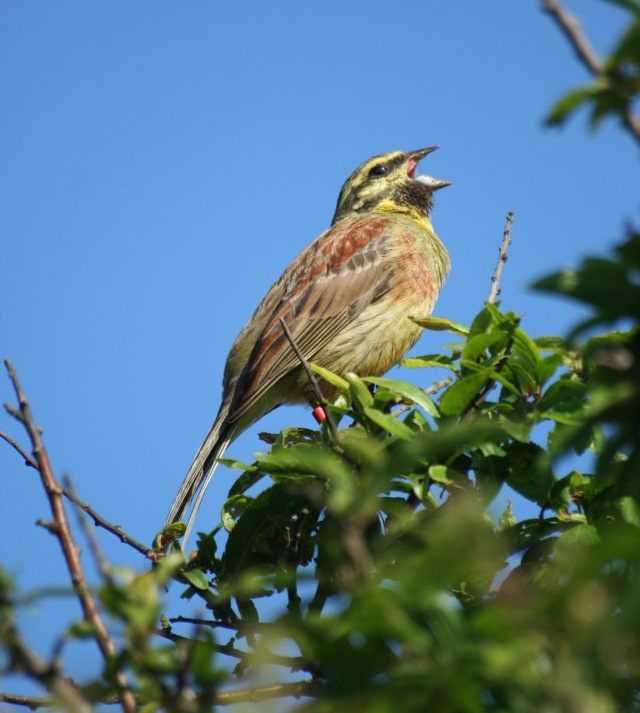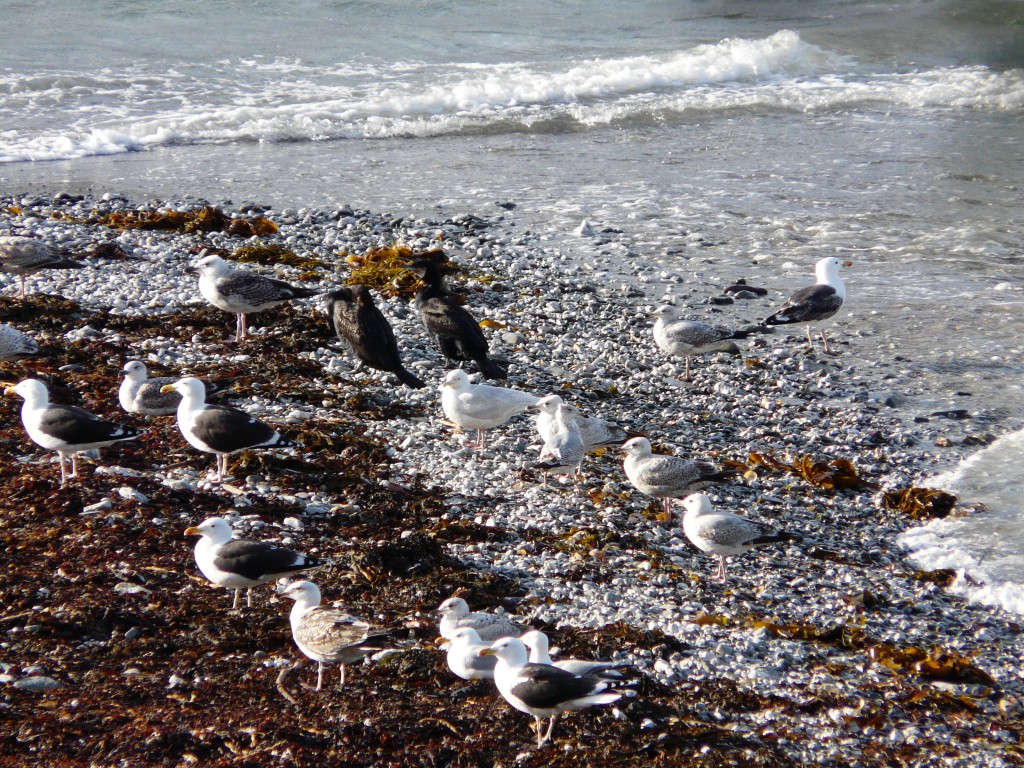Two recent press releases from the RSPB adressing issues in the South-west – one positive the other unfortunately not so.
RSPB ‘Appalling’ destruction of wildlife-rich land in Devon by NHS
The RSPB has this morning sent a formal letter of complaint to Devon NHS bosses concerning the wilful destruction of land near Exminster. The site, Hillcrest, is home to a nationally important population of Cirl Buntings. The charity believes that the Devon NHS Trust’s action is a deliberate move to reduce the nature conservation value of the land in order to gain planning permission for development.
Cirl Buntings are almost entirely restricted to south Devon, in particular coastal areas. The species almost became extinct in the UK in the late 1980s but, due to the hard work of the RSPB and farmers, its numbers have started to recover. The charity is now concerned that destruction of land for development poses a growing threat for the bird.
Mark Robins, Senior Policy Officer for RSPB in the South-West, explained: “The RSPB has worked at Hillcrest for 15 years in partnership with NHS locally. This has included an active volunteer engagement from amongst the local community, to create high-quality wildlife habitat especially for the Cirl Bunting. It appears to us that a deliberate decision was taken to sacrifice the wildlife value… to make it easier to gain planning permission for development.
This has been a marvellous joint enterprise that fully reflected the values of the New Leaf project at Hillcrest — itself centred on social cohesion, environmental improvement and the local community. The RSPB paid for spring barley to go on the site — the resulting stubble, with its rich bank of weed seed, is what these birds rely on in winter. Last week, without any consultation with us, that [stubble] was sprayed and ploughed in. We’ve also worked to leave uncropped grassy margins round the field — rich in invertebrates. These too have been sprayed and ploughed in. We also worked to get the hedges right for the birds. These have now been flailed. And this hasn’t been done by mistake. In July we supplied site ecological data to the environmental consultants acting for NHS and included in our cover note; ‘the RSPB would be extremely concerned at any development at this site and we wish to be consulted on proposals’. But now the site is destroyed. To say the least, we are livid.
The RSPB is all about giving nature a home and particularly doing so in partnership with others, especially the local community. It is this wider context that adds to our anger at what has happened. We are not party to the full background but it appears to us that a deliberate decision was taken to sacrifice the wildlife value of the site as part of a determination to make it easier to gain planning permission for development. While we understand that the Devon NHS Trust is at liberty to manage its estate as it feels fit, including developing the land, the way this has been undertaken has left no opportunity to seek good outcomes for nature. The NHS has a duty to have regard to the natural environment, to set a good example. What has been done here is the precise opposite.”
The RSPB has asked the NHS to give urgent consideration to three key issues:
- An adequate explanation, not to just the RSPB, but also the local community
- Short-term mitigation for the loss of the wintering habitat for the key species on this site
- Replacement habitat for what has been lost as a result of this action
NHS response
A spokesman for Devon Partnership NHS Trust has since commented: “We understand the RSPB’s strength of feeling about this issue and we have apologised for the action that has been taken on the Hillcrest site. We have agreed that we will provide feed for the Cirl Buntings over the winter and we will remain in close contact with the RSPB as the project moves ahead.”
RSPB
Tuesday 12th November 2013
RSPB Seabird death chemical to be banned
Wildlife charities have welcomed the International Maritime Organisation (IMO)’s swift action to ban ships across the world from discharging all forms of high-viscosity polyisobutylene (PIB) into the sea during tank cleaning operations. PIB was the chemical responsible for the deaths of over 4,000 seabirds on the south-west coast earlier this year. The tragedy, the largest marine pollution incident of its kind in the region since Torrey Canyon, shocked thousands of people.
At a meeting of the IMO’s working group on the Evaluation of Safety and Pollution Hazards of Chemicals (ESPH) in London today (22nd October), it was decided to change the classification of high-viscosity PIBs to require full tank prewash and disposal of all residues at port and prohibit any discharge at sea from 2014. This will also apply to new “highly reactive” forms of PIB, which are currently being transported unassessed. The recommendation to do this had been made by the Maritime and Coastguard Agency (MCA) on behalf of the UK Government, following vigorous campaigning by wildlife charities and the public.
Alec Taylor, Marine Policy Officer for the RSPB, said; “We are delighted with the action taken by the IMO. The global trade in PIB products is increasing and with it the risks to our precious marine environment. Today’s global ban on the deliberate discharge of high-viscosity PIBs into our seas is a real step forward and one that we hope will end this particular pollution threat to seabirds and other marine life.”
Between February and April this year over 4,000 seabirds of at least 18 species, mainly Guillemots, were washed up on beaches from Cornwall to Dorset in two separate incidents. The majority were dead, but some were alive and taken for treatment by the RSPCA at their West Hatch Centre. The subsequent MCA investigation revealed that the birds had been smothered with high-viscosity PIB. The same substance was also responsible for the deaths of hundreds of seabirds off the Dutch coast in March 2010.
RSPCA senior wildlife scientist Adam Grogan said: “We welcome this decision. Our staff worked around the clock washing and treating these poor birds in January and April and it was heartbreaking seeing the pitiful state they were in. Hopefully this will help stop incidents like these happening again, and save wildlife from suffering and dying like this in the future.”
Joan Edwards, Head of Living Seas for The Wildlife Trusts, said: “We welcome today’s ban. The thousands of dead and dying seabirds witnessed earlier this year were the most visible victims of mismanagement. Impacts on other parts of marine life support systems may have been just as widespread, and more serious. Not to mention the impacts on tourism of dead seabirds on the beach — particularly pressing in south-west counties which rely so heavily on summer visitors.”
Peter Burgess, Devon Wildlife Trust’s Conservation Advocacy Manager, said: “This is an important decision for wildlife. It’s pleasing to see how quickly the IMO has acted and heartening to hear that local people’s concerns have helped build momentum towards achieving this. However, we do see the PIB incidents of 2013 as a wake-up call. Dead and dying seabirds washed up on some of the south-west’s most popular beaches were hard to ignore. But how many unseen and unreported activities are damaging our precious marine wildlife in undersea habitats that are almost completely unprotected by law?”
The public response to the tragedy was significant, with more than 25,000 people signing petitions organised by 38 Degrees and Avaaz calling for a ban on the discharge of PIB. Alec Taylor from the RSPB added: “There was a lot of hard work by RSPB, other wildlife charities and the MCA, with support from several MPs on the south-west coast. But the huge support we received from members of the public, many of whom experienced the effects of this pollution first-hand as they walked the beaches, was perhaps the clinching factor in achieving such a quick decision to prevent discharges of harmful PIBs.”
RSPB
Tuesday 22nd October 2013



